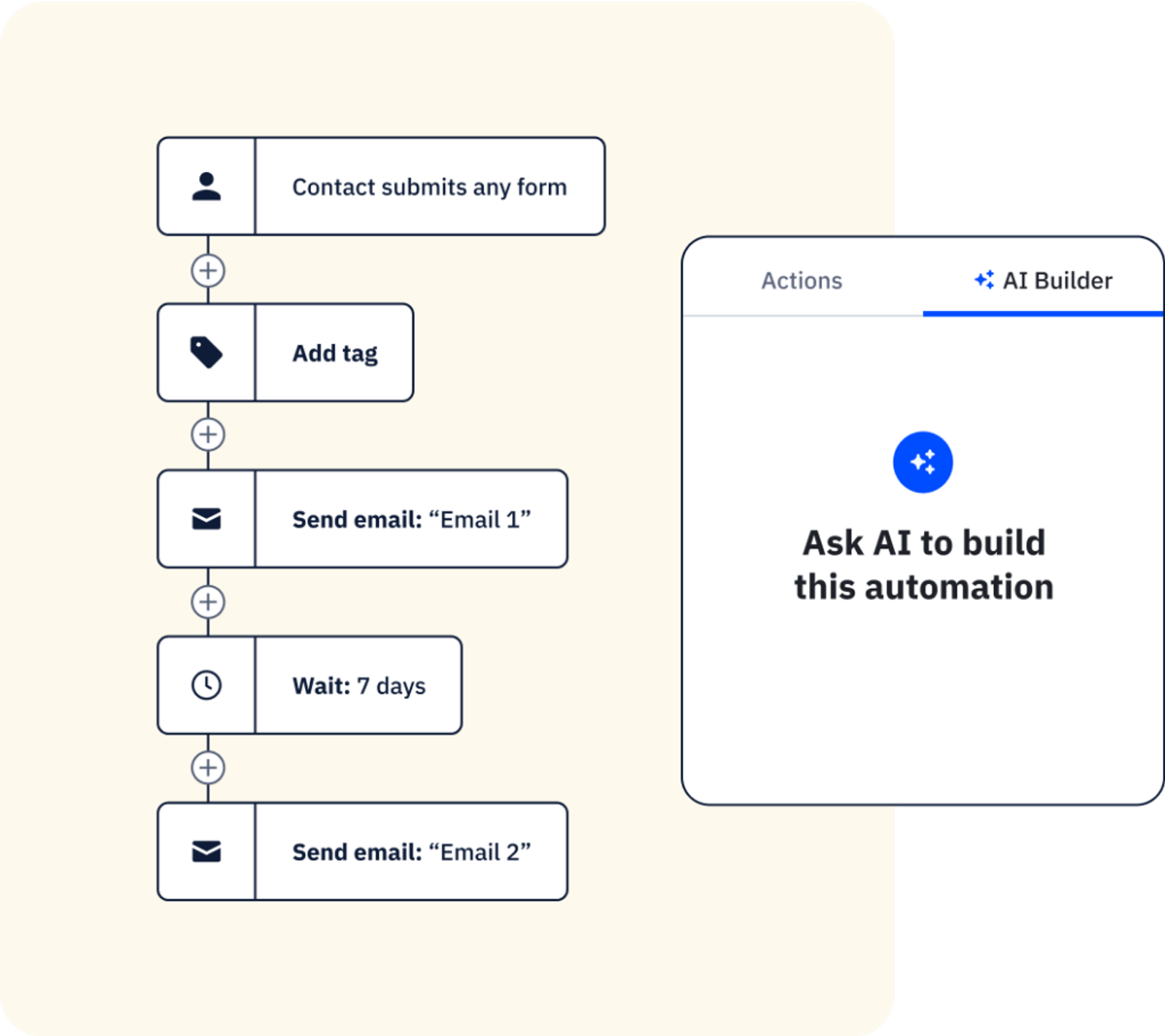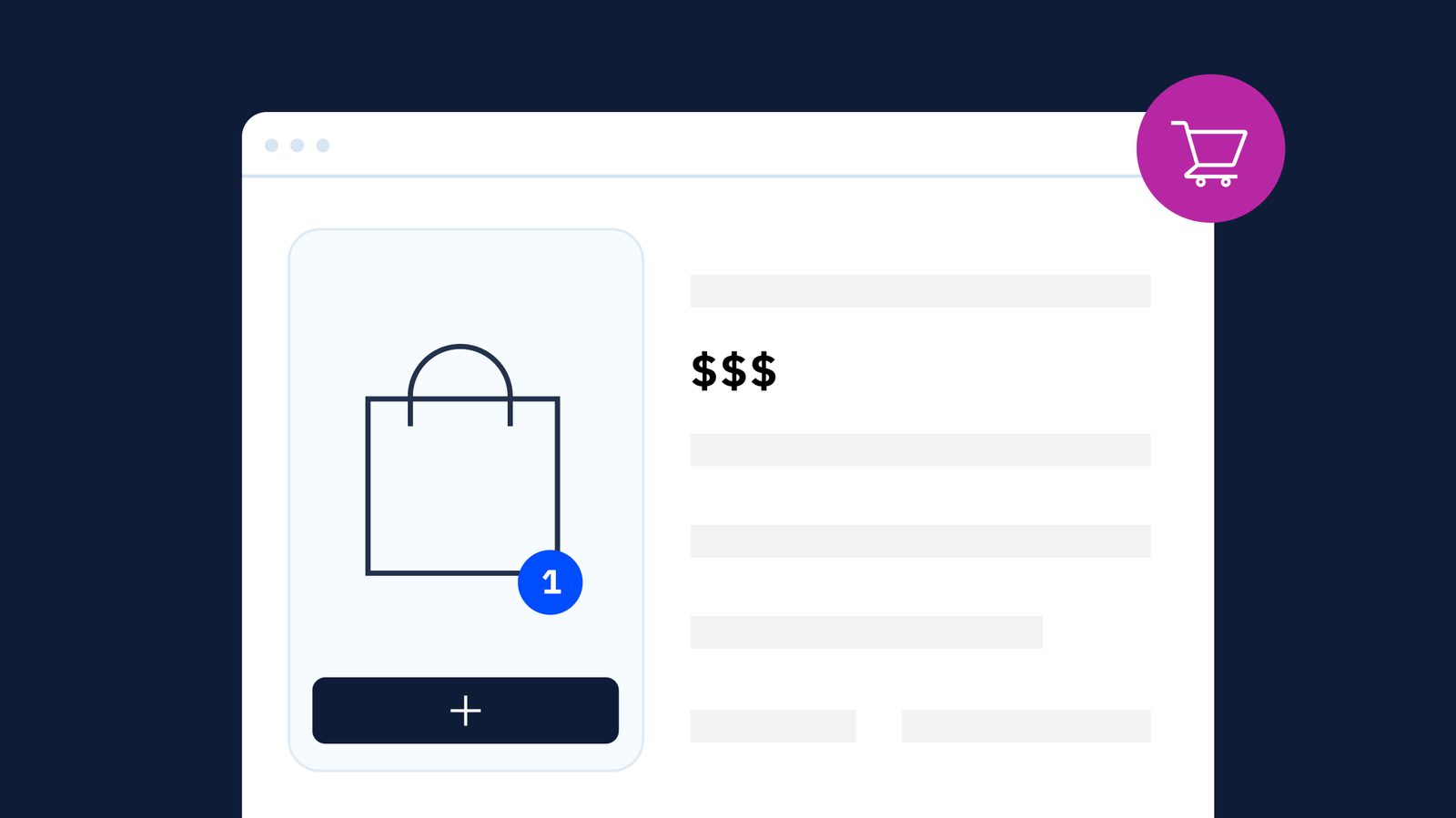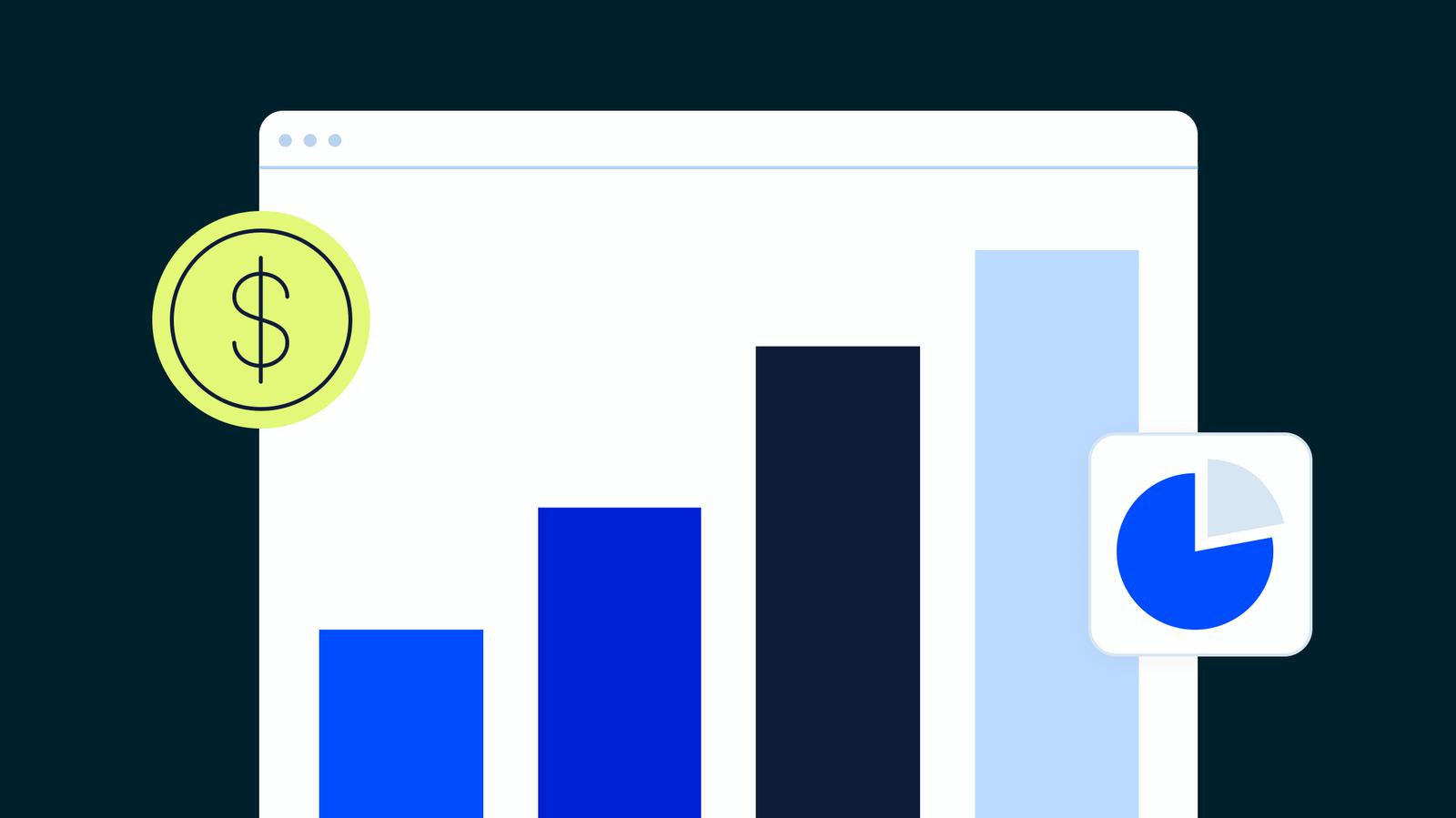The world of e-commerce is expansive and spans a number of topics.
In this post, we'll talk about everything you need to know when it comes to running your own online store, including topics like how e-commerce works, the different types, the e-commerce trends you should be paying attention to, the best e-commerce platforms, how to incorporate marketing automation into your e-commerce strategy, and much more.
You'll even find an e-commerce calendar that'll help you plan out powerful, engaging, and timely email campaigns throughout the year. Let's dive in.
What is e‑commerce?
E-commerce, short for electronic commerce, refers to the buying and selling of goods and services over the internet. It involves online transactions between businesses and consumers (B2C), as well as between businesses (B2B). E-commerce has become a significant aspect of the modern economy, forever changing the way businesses operate and consumers shop.
The background of e-commerce can be traced back to the 1960s when electronic data interchange (EDI) was introduced to facilitate electronic transactions between companies. However, the true evolution of e-commerce began in the 1990s with the rise of the internet and advancements in technology.
Several key milestones contributed to the growth of e-commerce:
- Emergence of the internet: The development of the World Wide Web in the early 1990s provided a platform for businesses to create an online presence and reach a global audience.
- Secure online transactions: The introduction of secure online payment systems, such as SSL (Secure Socket Layer), made it safer for consumers to make online purchases, boosting confidence in e-commerce.
- Online marketplaces: Websites like Amazon and eBay emerged as online marketplaces, connecting buyers and sellers in a virtual environment and offering a wide range of digital products.
- Mobile commerce (M-commerce): The proliferation of mobile devices and smartphones has further expanded e-commerce through mobile apps and optimized websites, enabling users to shop on the go.
- Digital marketing and social media: E-commerce has benefited from digital marketing strategies and social media platforms for advertising and promoting products.
- E-commerce platforms and software: The development of e-commerce platforms, such as Shopify, Magento, and WooCommerce, has made it easier for businesses to set up and manage online stores.
- Logistics and supply chain innovations: Advances in logistics and supply chain management have improved the efficiency of order fulfillment and delivery, contributing to the growth of e-commerce.
- E-payment systems: The introduction of various electronic payment methods, including credit cards, digital wallets, and cryptocurrencies, has facilitated seamless e-commerce transactions.
Over the years, e-commerce has evolved, incorporating new technologies like artificial intelligence, virtual reality, and augmented reality to enhance the online shopping experience. It's become a fundamental part of the global economy, providing businesses and consumers with convenient and efficient ways to engage in commercial transactions.
How does e‑commerce work?
E-commerce isn't possible without the internet, where consumers go to browse, research, and buy products and services.
Businesses create online stores where they showcase their products or services, and consumers can browse, select items, and add them to their digital shopping cart. Then, they make a purchase by way of secure online payment methods, such as credit cards, digital wallets, or other electronic payment systems.
Once a purchase is made, the e-commerce platform processes the order, and the business arranges for the delivery of the products directly to the customer. Additionally, e-commerce often involves digital marketing strategies, user reviews, and personalized recommendations to attract and engage customers in the online shopping experience.
E-commerce also takes into account the customer's purchase journey and the steps involved, from brand awareness all the way through to after the sale. This is the e-commerce sales funnel, a crucial piece of the puzzle companies leverage to provide a realistic structure for capturing and nurturing leads.
Types of e‑commerce
There are different types of e-commerce, like business-to-business (B2B), business-to-consumer (B2C), and consumer-to-consumer (C2C). Let's take a look at each one.
Business-to-consumer (B2C) e-commerce
B2C e-commerce refers to online transactions between a business and a consumer.
In this type of e-commerce, businesses sell products or services directly to consumers through online platforms, websites, or electronic storefronts. B2C e-commerce is a common and widely recognized form of electronic commerce, and it encompasses a variety of industries, including retail, entertainment, travel, and more. Customers can browse product catalogs, make purchases, and pay for goods or services electronically.
Examples of B2C e-commerce include online retailers like Amazon, fashion websites, streaming services, and food delivery platforms. This model has become increasingly popular due to the convenience it offers consumers in terms of accessibility, product variety, and the ability to shop from anywhere with an internet connection.
Consumer-to-consumer (B2C) e-commerce
C2C e-commerce refers to online transactions that occur directly between individual consumers.
Under the umbrella of consumer-to-consumer e-commerce, individuals sell products or services to other individuals through online platforms or marketplaces. C2C e-commerce platforms provide a virtual space where individuals can list items for sale, communicate with potential buyers or sellers, and complete transactions.
One of the key characteristics of C2C e-commerce is that it enables ordinary people to become both buyers and sellers, creating a peer-to-peer marketplace. Examples of C2C platforms include online auction sites like eBay, classified advertising websites such as Craigslist, and various mobile apps that allow users to buy and sell second-hand items. The success of C2C e-commerce often relies on user trust, as individuals are dealing directly with one another in the online marketplace.
Business-to-business (B2B) e-commerce
B2B e-commerce refers to online transactions between businesses or enterprises.
This means that businesses sell their product or service to another business through digital platforms or electronic exchanges. B2B e-commerce is distinct from B2C and C2C e-commerce because the primary transactions involve wholesale and bulk purchases, typically for further production, resale, or business operations.
Like a B2C business, each B2B e-commerce business has a different size, operation, level of complexity, and business model. In other words, B2B e-commerce can include several solutions, from digital products to physical products such as machinery, equipment, inputs, consumer goods, a product packaging box, and more.
E‑commerce trends
Some may say that trends are fleeting, but in the context of e-commerce, trends are avenues of opportunity to meet your customers where they are and cater to their needs (which will always be changing).
Customers are online. Gone are the days when consumers needed to shop in physical store locations. With shifting buyer preferences comes the need for companies to cater to their customers and ensure their e-commerce motion is in full working order.

Making use of trends is incredibly important as an e-commerce business. The average consumer expects a lot out of the brands they buy from, and in order to stay ahead of the curve, you should lean into the trends. Want to learn more?
E‑commerce platforms
So, you're planning to start your own e-commerce business and have done some initial research. You have a product or service to market and are ready to choose a software solution to help you reach your audience and close on some sales. Lucky for you, there is no shortage of great e-commerce platforms for you to choose from.
E‑commerce marketing
You have your storefront up, and your product is the best in its class. These things are great but mean next to nothing if you don't invest in e-commerce marketing. E-commerce marketing offers brands an avenue to reach audiences beyond traditional borders and opens the door for brands to consider how they're marketing their products or services.
If you want to dive much deeper into optimizing your marketing efforts and better understand how to use your e-commerce platform of choice to the fullest, we've got the guide for you.
E-commerce marketing throughout the year
An e-commerce marketing strategy isn't something you can set up and walk away from. For continued growth and customer engagement, you need to understand the market, constantly talk to your customers, know where they are (whether that's in person or through a mobile device), and know where to place your bets while marketing your brand throughout the year.
As an online retailer, this can be daunting (and even vague). This is exactly why we created an e-commerce calendar you can download for free. This calendar gives you powerful e-commerce holiday tips and help you identify which holidays and events you can create powerful marketing campaigns around. Plus, you’ll discover general timelines for when you should start thinking about bigger events like Black Friday and Christmas.
Email marketing for e‑commerce
Email marketing plays a pivotal role in the success of your e-commerce business.
Think of the emails you receive daily from brands you know and trust. When done right, a marketing email can be the lever that businesses need to engage with their audience in an authentic way while also nurturing them through to the purchasing phase.
Email marketing is more than a catchy subject line—it’s a targeted communication strategy that allows businesses to connect with their audience via email directly. Companies build email lists that form their contact base and use them for promotional messages and essential transactional emails. These lists contain the email addresses of potential customers who’ve voluntarily subscribed, perhaps through a landing page. Once they’ve opted in, the company initiates a series of promotional emails underpinned by the art of lead nurturing. This technique masterfully guides these contacts down the sales funnel, transforming them from subscribers to loyal customers.
E‑commerce automation
There's much more to e-commerce than selling products. An entire process kicks off as soon as a customer clicks purchase. This is where implementing e-commerce automation is extremely important, especially for growing companies that do a lot of business.
E-commerce automation is the implementation of technology and software solutions to streamline and automate various operational tasks that happen behind the scenes of online retail. These tasks can include inventory management, order processing, payment handling, customer service, and marketing activities.
Plus, automation tools like ActiveCampaign give you the power to see exactly what products or pages your customers are looking at and collect all that information for you. You can set up automations and bring specific customers (let’s say those who look at Product A’s landing page) into a pre-built automation that will follow up and send them an email talking about Product A.
Automating these tasks can save you time and give your customers peace of mind that their purchase is official and will be delivered (email confirmations, tracking numbers, emailed receipts, etc.). It also builds trust between you and your customers and positions you as a brand that takes the customer experience seriously.
Marketing automation for online retailers
E-commerce automation and marketing automation are intrinsically tied. Combined they're e-commerce marketing automation.
While e-commerce automation takes care of things like inventory management and payment handling, marketing automation is the process of automating repetitive marketing tasks (like segmenting your contacts so you're sending information to the right customers at the right time and following up with customers who may have abandoned their cart). This automation saves time, brings the customer closer to your brand, and helps you capture as many retail sales as possible.
Email marketing software for e-commerce businesses
Just like selecting an e-commerce platform, choosing the right email marketing software is a crucial decision. The email marketing solution you choose will be based on different factors like your company size, demographic, and unique business goals. Every company is different and has different metrics they want to drive. It can be hard to know which email marketing software will suit your needs best.
This is why we've put together a software comparison list that lays out the best email marketing software in the market today, their features, misses, pricing details, and more.
Wrapping up
E-commerce is an expanding market and is quickly becoming an essential piece for businesses around the world. Making sure your e-commerce motion and strategy are buttoned up is a huge determining factor of your future success.
If you're looking for a platform that will help you reach and engage your customer base fast, ActiveCampaign has a lot to offer:
- Continually drive sales and follow up with customers with timely, personalized communications
- Dig into the data and understand where your customers are in their buying journey
- Deliver a consistent and connected experience across email, SMS, and social
- Follow up on abandoned carts and capture more revenue
- Showcase your product catalog and cross-sell relevant products
All of this is possible with ActiveCampaign. Elevate your e-commerce website with intelligent, powerful automation that'll give you the tools to grow your business and boost your retail sales.
Ready to try? Sign up for a free trial below!







